When Do Puppies Lose Their Baby Teeth? – The Teething Timeline
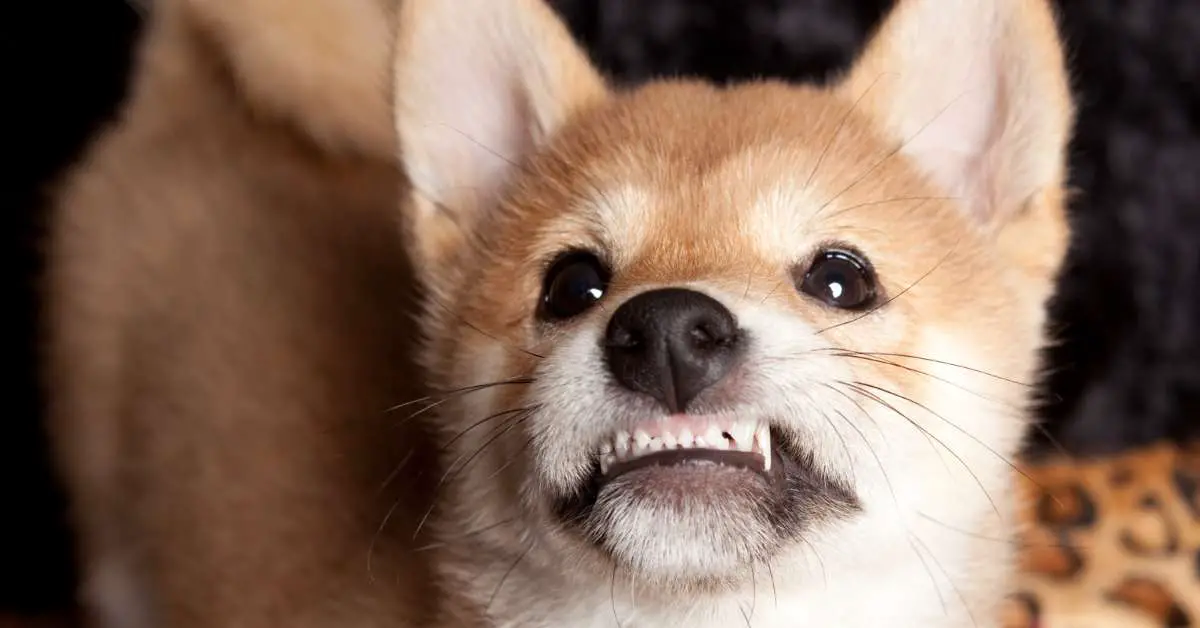
Teething is a crucial aspect of a puppy’s development, marked by the gradual loss of baby teeth and the emergence of adult ones (just like human babies).
Pet owners must understand that puppies lose their teeth (baby teeth) as they age.
So, a proper teething process is a must for every furry friend to ensure their health and safety.
In this article, we will delve into the various stages of puppy tooth development (from baby tooth to adult tooth) and discuss effective care strategies for teething puppies.
Key Notes
- Embark on a knowledgeable journey into “When Do Pups Lose Their Baby Teeth,” equipping yourself with essential insights for a smooth teething experience in puppy parenting.
- Discover the teething stages, timeline, and practical care tips to ensure your puppy’s transition to strong and healthy adult teeth is a breeze.
- From the neonatal stage to adult teeth, unravel the mysteries of puppy teeth development and become the ultimate companion in your furry friend’s dental development.
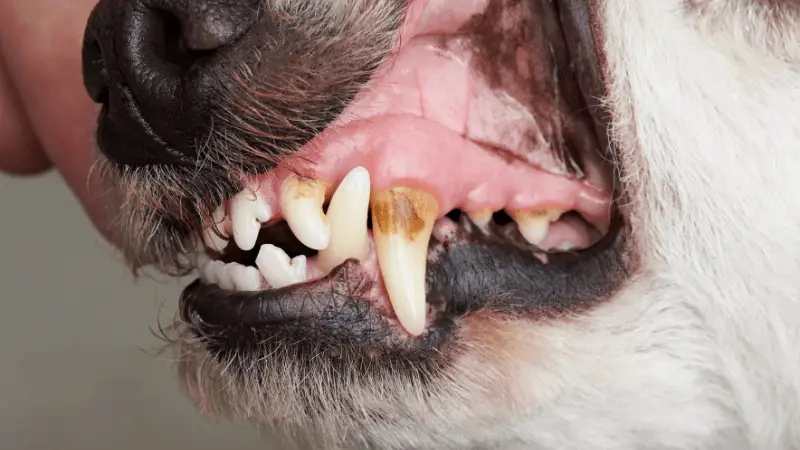
When Do Puppies Lose Their Baby Teeth?
Well! This question often crosses the minds of dog owners as they witness their adorable companions chewing on everything in sight.
Puppy teeth development is a natural process that spans several weeks, involving the shedding of deciduous teeth and the eruption of permanent ones.
Knowing when puppies lose their first baby teeth, is not just a matter of curiosity; it holds practical significance.
This knowledge aids pet owners in providing appropriate care and support during this critical developmental phase.
Effective management of a teething puppy can prevent unwanted behaviors and ensure the overall well-being of the puppy’s mouth itself.
According to Mariana Roccaro, an Assistant Professor at the University of Bologna, “Currently, the gold standard for estimating a puppy’s age in clinical practice and forensic investigations is a dental examination.”
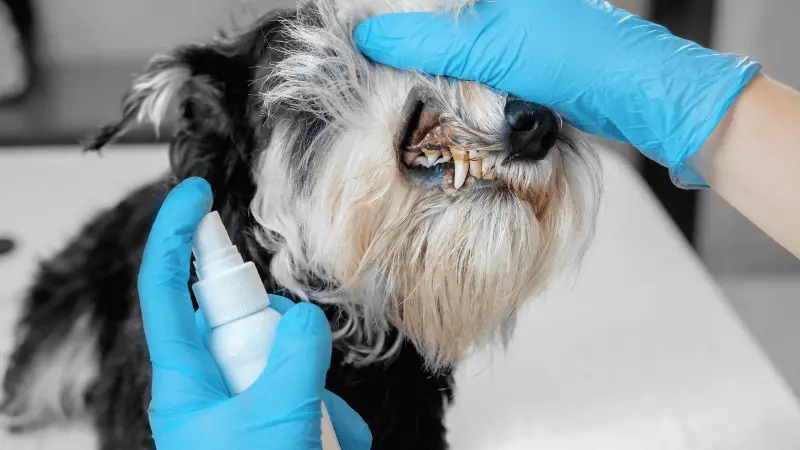
Connection Between Teething and Overall Puppy Health
The teething process is intricately linked to a puppy’s overall health. Discomfort during teething can affect a puppy’s behavior, eating habits, and even sleep patterns.
A well-managed teething experience with milk teeth contributes to the formation of healthy adult teeth and sets the foundation for good oral hygiene.
Puppy Teething Stages
Neonatal Stage
The neonatal stage, spanning the first few (usually 2) weeks of a puppy’s life, is a crucial period marked by the absence of permanent teeth anywhere.
Neonatal puppies are toothless, relying solely on their mother’s milk for nutrition. This initial stage typically lasts from birth to about two weeks, playing a fundamental role in the pup’s early growth and development.
Although no teeth are present during the neonatal stage, signs of discomfort may manifest through increased restlessness and a heightened tendency to suckle more vigorously.
Transitional Stage
The transitional stage signifies the onset of the teething process, witnessing the first puppy’s baby teeth start to emerge.
At approximately three weeks or four months of age, the puppies start to embark on their teething journey, with the first set of deciduous incisors appearing.
Puppies exhibit heightened interest in chewing and biting to explore the world around them. This behavior serves a crucial purpose in the natural loosening of baby teeth.
Cutting Teeth
As the teething process progresses, puppies enter the cutting teeth stage (at 3.5 – 4 Months or 14 – 16 weeks), and various types of adult teeth start to emerge, each serving distinct functions.
According to Karina Lezama-García, a Ph.D. researcher at Universidad Autónoma Metropolitana (UAM), Mexico, “As the puppy teething begins, the dam (mother female dog) becomes evasive and refuses to nurse them for long periods (especially in 4rth week).”
Puppies develop incisors, canines, and molars during this phase, with each type playing a specific role in grasping, tearing, and grinding food. Discomfort during teething can lead to increased chewing on objects and potential irritability.
Providing appropriate outlets for chewing becomes indispensable during this stage to alleviate discomfort and aid in the healthy development of their permanent canine teeth.
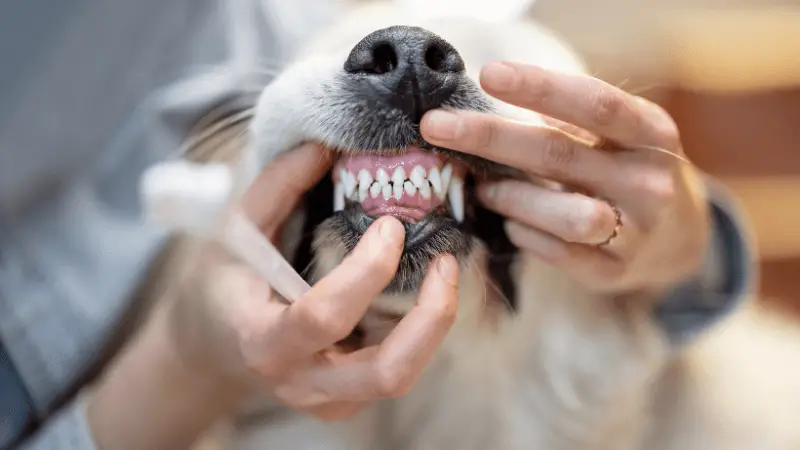
Teething Timeline
Timeline by Weeks
Understanding the puppy teething timeline well is paramount for pet owners to anticipate and address challenges associated with each stage proactively.
Between weeks 3-6, the teething baby’ journey begins with incisors, followed by canines around week 5, and molars appearing by week 6.
The shedding of baby canine teeth typically commences between 14 and 16 weeks, marking a crucial phase in a puppy teething development.
Variations in Teething Timelines Among Different Breeds
Teething timelines may vary among different breeds. Smaller breeds often complete the process earlier than their larger counterparts. Understanding these variations aids in tailoring care strategies to meet individual breed needs.
Signs of Teething
Recognizing the signs of teething is vital for pet owners to provide timely care and intervention.
- Behavioral Changes: Teething puppies may exhibit increased chewing, biting, and mouthing behaviors as they explore their surroundings. During this phase, heightened vocalization and signs of discomfort during meals are common behavioral indicators.
- Physical Signs of Teething Discomfort: Keep a keen eye for physical signs such as reddened gums, excessive drooling, and occasional bleeding during tooth eruption. These physical manifestations signal teething discomfort, and addressing them promptly ensures a more comfortable experience for your puppy.
Fact: Puppy teeth, usually adult teeth, can cause less discomfort as compared to deciduous teeth.
Caring for Teething Puppies
Appropriate Chew Toys
Choosing the right chew toy or some safe chew toys is paramount for relief during teething.
- Safe Options for Teething Relief: Soft rubber or nylon toys explicitly designed for teething puppies offer a safe outlet for chewing. Avoiding small or easily breakable toys is crucial.
- Choose the Right Toys for Different Stages: Their chewing needs evolve as puppies progress through the teething stages. Adapting the type of chew toys accordingly ensures continuous relief.
Dental Care
Maintaining good dental hygiene is essential for preventing long-term oral health issues.
- Importance of Dental Hygiene for Puppies: Establishing good dental habits early in a puppy’s life contributes to long-term oral health. Regular brushing and dental check-ups are key components of this care.
- Brushing and Other Dental Care Practices: Using a puppy-friendly toothbrush, toothpaste, and dental chews or wipes helps prevent plaque buildup on puppy teeth and promotes healthy gums.
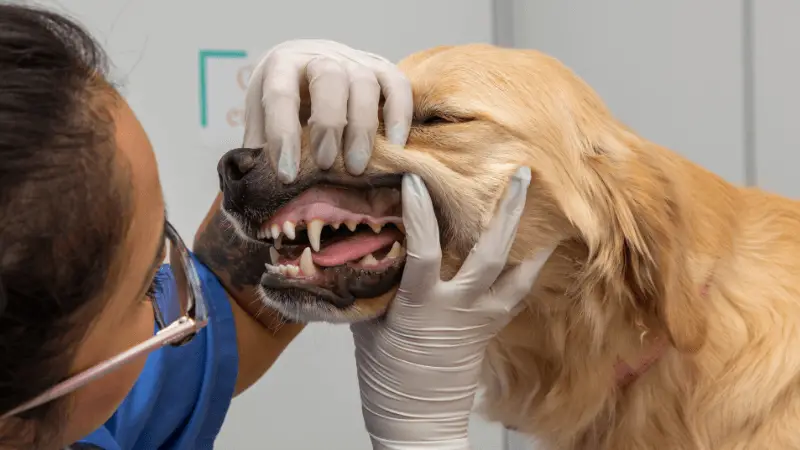
Diet and Nutrition
Nutrition plays a vital role in supporting a puppy’s overall health, including dental well-being.
- Choosing the Right Food for Teething Puppies: Opting for high-quality puppy food with the right balance of nutrients supports the development of a strong puppy’s baby teeth and gums.
- Nutritional Support for Dental Health: Incorporating dental treats or supplements enriched with essential nutrients contributes to a puppy’s overall dental well-being.
Challenges and Solutions
Common Issues During Teething
While teething is natural, it can present challenges for both puppies and their owners.
- Biting and Chewing Behaviors: Teething puppies may bite and chew on inappropriate objects. Redirecting these behaviors towards designated chew toys helps manage this challenge.
- Potential Health Concerns: Sometimes, teething may lead to health concerns such as gum infections or retained baby teeth. Regular veterinary check-ups are essential to address such issues promptly.
Solutions and Tips
Addressing teething challenges requires a combination of proactive measures and professional guidance.
- Positive Reinforcement Training: Using positive reinforcement techniques encourages desired behaviors and helps curb excessive chewing or biting.
- Veterinary Guidance for Persistent Issues: If teething issues persist or if there are concerns about a puppy’s dental health, consulting a veterinarian is crucial for tailored advice and intervention.
FAQs
When Does Teething Typically Start and End?
Teething typically begins around three weeks of age, with the emergence of deciduous incisors, and lasts until about six months when most permanent adult teeth emerge and have replaced the baby teeth.
How Can I Tell if My Puppy Is Teething?
Look out for increased chewing, biting, and mouthing behaviors. Additionally, keep an eye on signs like reddened gums, excessive drooling, and occasional bleeding during tooth eruption.
What Signs Indicate Discomfort During Teething?
Signs of discomfort during teething include behavioral changes such as increased chewing and biting, vocalization, and signs of discomfort during meals.
Physical indicators include reddened gums, excessive drooling, and occasional bleeding during tooth eruption.
Are There Specific Breeds With Longer or Shorter Teething Periods?
Yes, teething timelines can vary among different breeds. Smaller breeds often complete the teething process earlier than larger breeds.
Understanding these variations helps tailor care strategies based on individual breed needs.
Conclusion
In order to be a responsible pet owner, it is essential to have a good understanding of when puppies lose their teeth (especially baby teeth).
By navigating the many stages of teething in a puppy, detecting the signals of discomfort, and applying appropriate care practices, parents can guarantee that their furry friends move into maturity with teeth that are strong and healthy.
As is the case with any other aspect of pet care, paying careful attention to the teething process of a puppy builds the groundwork for a lifetime of mental and physical health as well as good companionship.
